Abhidhamma Studies

Wisdom Publications
199 Elm Street
Somerville, Massachusetts 02144 USA
www.wisdompubs.org
Buddhist Publication Society 1965, 1998
First edition 1949 (Frewin & Co. Ltd., Colombo)
Second edition, revised and enlarged 1965 (BPS)
Third edition 1976, 1985 (BPS)
Fourth revised and enlarged 1998 (Wisdom)
Fifth edition 2010
All rights reserved.
No part of this book may be reproduced in any form or by any means, electronic or mechanical, including photography, recording, or by any information storage and retrieval system or technologies now known or later developed, without permission in writing from the publisher.
Library of Congress Cataloging-in-Publication Data
Nyanaponika, Thera, 19011994
Abhidhamma studies : Buddhist explorations of consciousness and time / Nyanaponika Thera ; edited with an introduction by Bhikkhu Bodhi.
p. cm.
Originally published: Colombo : Frewin, 1949.
Includes bibliographical references.
ISBN 0-86171-135-1 (alk. paper)
1. Abhidharma. 2. Tipiaka. Abhidhammapiaka. Dhammasagai
Criticism, interpretation, etc. I. Title.
BQ4195.N92 1998
294.3824dc21
97-38780
ISBN 978-0-86171-135-2
5 14 13 12 11
8 7 6 5 4
Cover design by TL. Interior design by Adie Russell. Set in Diacritical Garamond 12/14.75.
Wisdom Publications books are printed on acid-free paper and meet the guidelines for the permanence and durability of the Committee on Production Guidelines for Book Longevity of the Council on Library Resources.
Printed in the United States of America.
 This book was produced with environmental mindfulness. We have elected to print this title on 30% PCW recycled paper. As a result, we have saved the following resources: 4 trees, 1 million BTUs of energy, 412 lbs. of greenhouse gases, 1,983 gallons of water, and 120 lbs. of solid waste. For more information, please visit our website, www.wisdompubs.org. This paper is also FSC certified. For more information, please visit www.fscus.org.
This book was produced with environmental mindfulness. We have elected to print this title on 30% PCW recycled paper. As a result, we have saved the following resources: 4 trees, 1 million BTUs of energy, 412 lbs. of greenhouse gases, 1,983 gallons of water, and 120 lbs. of solid waste. For more information, please visit our website, www.wisdompubs.org. This paper is also FSC certified. For more information, please visit www.fscus.org.
Contents
I The Abhidhamma Philosophy:
Its Estimation in the Past, Its Value for the Present
In his preface to this book Nyanaponika Thera explains that these studies originated while he was engaged in translating into German the Dhammasaga and the Atthaslin, respectively the first book of the Pli Abhidhamma Piaka and its authorized commentary. He translated these works during the trying years of World War II, while residing in the British civilian internment camp at Dehra Dun, in north India (194146). Unfortunately, these two translations, made with such keen understanding and appreciation of their subject, remain unpublished. The Dhammasaga appeared only in a very limited cyclostyle edition (Hamburg, 1950), long unavailable. The Atthaslin has been in preparation for the press since the mid-1980s, but it is still uncertain whether it will ever see the light of day.
The investigations stimulated by this translation work, however, have enjoyed a happier fate. Soon after returning to Sri Lanka following the war, Ven. Nyanaponika recorded his reflections on the Abhidhamma in a set of four essays, which became the first version of this book, entitled Abhidhamma Studies: Researches in Buddhist Psychology. The manuscript must have been completed by 15 March 1947, the date of the preface, and was published in a series called Island Hermitage Publications (Frewin & Co. Ltd., Colombo, 1949). This imprint emanated from the Island Hermitage at Dodanduwa, a monastic settlement chiefly for Western Buddhist monks founded in 1911 by Ven. Nyanaponikas teacher, Ven. Nyanatiloka Mahthera (18781957). Ven. Nyanatiloka, also from Germany, was the first Theravda bhikkhu from continental Europe in modern times. Ordained in Burma in 1903, he soon established himself as an authority on the Abhidhamma, and it was from him that Ven. Nyanaponika acquired his deep respect for this abstruse branch of Buddhist learning.
While Island Hermitage Publications came to an early end, its animating spirit was reincarnated in the Buddhist Publication Society (BPS), which Ven. Nyanaponika established in Kandy in 1958 together with two lay friends. Accordingly, in 1965 a second edition of Abhidhamma Studies appeared, published by the BPS. This edition had been stylistically polished (incorporating suggestions written into a copy of the first edition by Bhikkhu amoli) and included a new first chapter that served to explain the high esteem in which the Theravda tradition holds the Abhidhamma. A third edition, issued in 1976, contained only minor corrections. For the present edition I have merely reformulated a few awkward sentences in the third edition, reorganized the notes, provided additional references, and supplied a bibliography. The subtitle has also been changed to convey a clearer idea of the books contents.
Although these essays are largely intelligible on their own and can be read with profit even by those unacquainted with the Abhidhamma texts themselves, they will naturally be most rewarding if they are read with some awareness of the doctrinal and scriptural matrix from which they have emerged. While an introduction like this is certainly not the place for a thorough historical and doctrinal survey of the Abhidhamma, in what follows I will attempt to provide the reader with the information needed to place Ven. Nyanaponikas studies in their wider context. First I will briefly present an overview of the Abhidhamma literature on which he draws; then I will discuss the principal strains of Abhidhamma thought that underlie the essays; and finally, in the light of this background, I will highlight some of the ideas that Ven. Nyanaponika is attempting to convey in this book.
Before proceeding further I must emphasize at the outset that Ven. Nyanaponikas essays are not historical in orientation, and are thus very different in character from the well-known Abhidhamma studies of Erich Frauwallner, which attempt to trace the historical evolution of the Abhidhamma.the Consciousness chapter of the Dhammasaga, his treatment of this subject branches out into broader issues concerning the Abhidhamma analysis of mind and the bearings this has on the Buddhist spiritual life. The essays do not merely repeat the timehonored fundamentals of the Abhidhamma philosophy, but strike out in a direction that is innovative and boldly exploratory. Despite their strong rootedness in an ancient, minutely analytical corpus of knowledge, they venture into territory virtually untouched by the great Abhidhamma commentators of the past, raising questions and throwing out hypotheses with a depth of insight that is often exhilarating. It is this boldness of intuition, coupled with careful reflection and a capacity for mature judgment, that makes this little book a contemporary gem worthy of a place among the perennial classics of Abhidhamma literature.
THE ABHIDHAMMA LITERATURE
The Abhidhamma is a comprehensive, systematic treatment of the Buddhas teachings that came to prominence in the Buddhist community during the first three centuries after the Masters death. The development of Abhidhamma spanned the broad spectrum of the early Buddhist schools, though the particular tracks that it followed in the course of its evolution differed markedly from one school to another. As each system of Abhidhamma assumed its individual contours, often in opposition to its rivals, the respective school responsible for it added a compilation of Abhidhamma treatises to its collection of authorized texts. In this way the original two canonical collections of the Buddhas Wordthe Sutta and Vinaya Piakascame to be augmented by a third collection, the Abhidhamma Piaka, thus giving us the familiar Tipiaka or Three Baskets of the Doctrine.
Next page
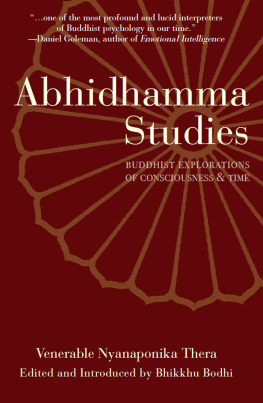

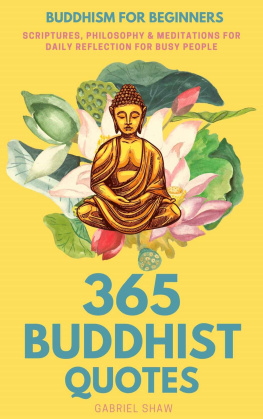
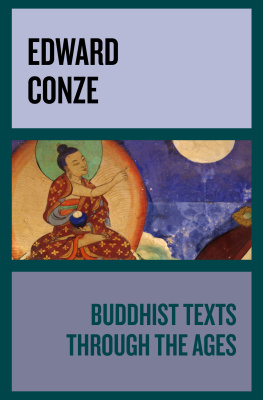
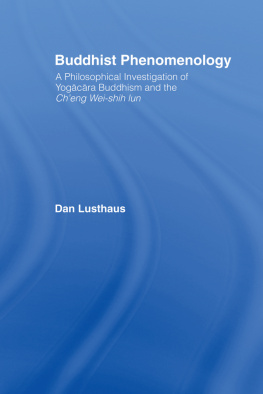
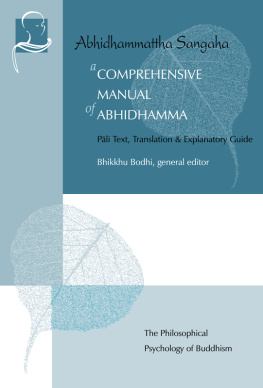
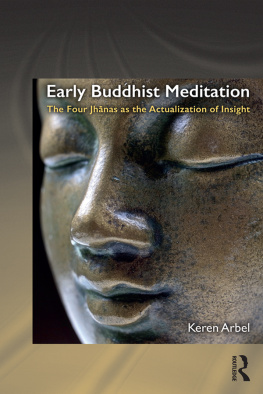
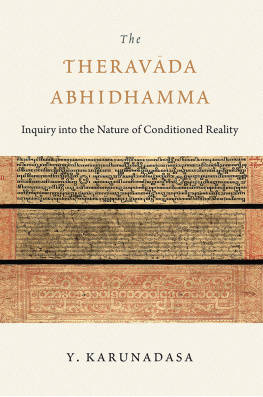
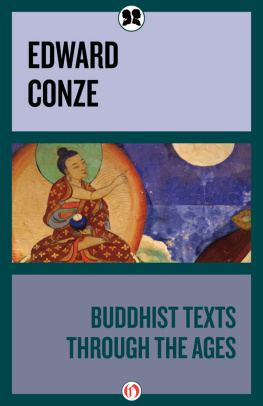
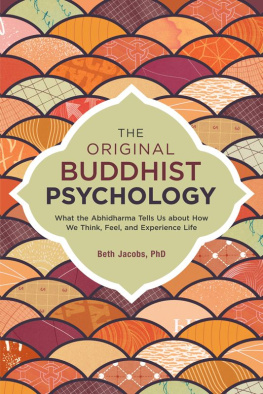

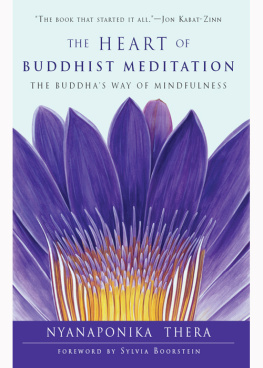
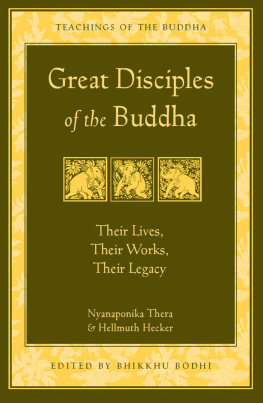

 This book was produced with environmental mindfulness. We have elected to print this title on 30% PCW recycled paper. As a result, we have saved the following resources: 4 trees, 1 million BTUs of energy, 412 lbs. of greenhouse gases, 1,983 gallons of water, and 120 lbs. of solid waste. For more information, please visit our website, www.wisdompubs.org. This paper is also FSC certified. For more information, please visit www.fscus.org.
This book was produced with environmental mindfulness. We have elected to print this title on 30% PCW recycled paper. As a result, we have saved the following resources: 4 trees, 1 million BTUs of energy, 412 lbs. of greenhouse gases, 1,983 gallons of water, and 120 lbs. of solid waste. For more information, please visit our website, www.wisdompubs.org. This paper is also FSC certified. For more information, please visit www.fscus.org.